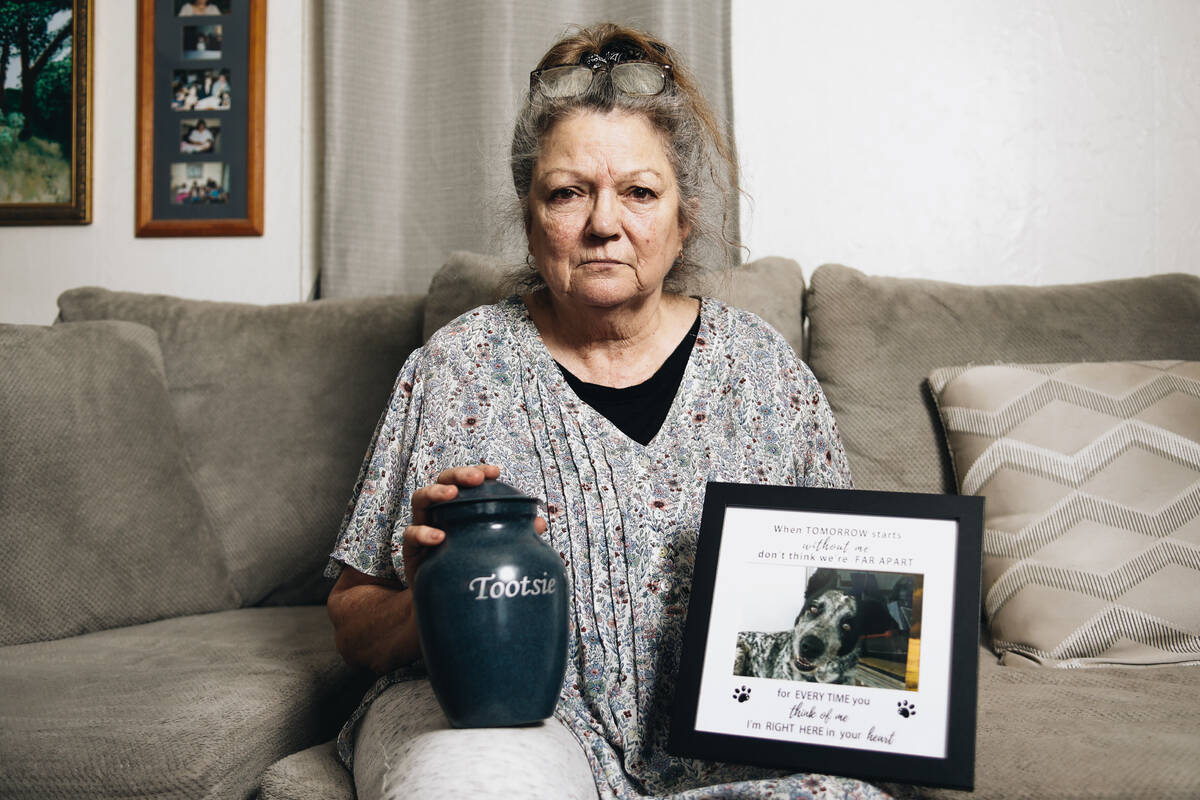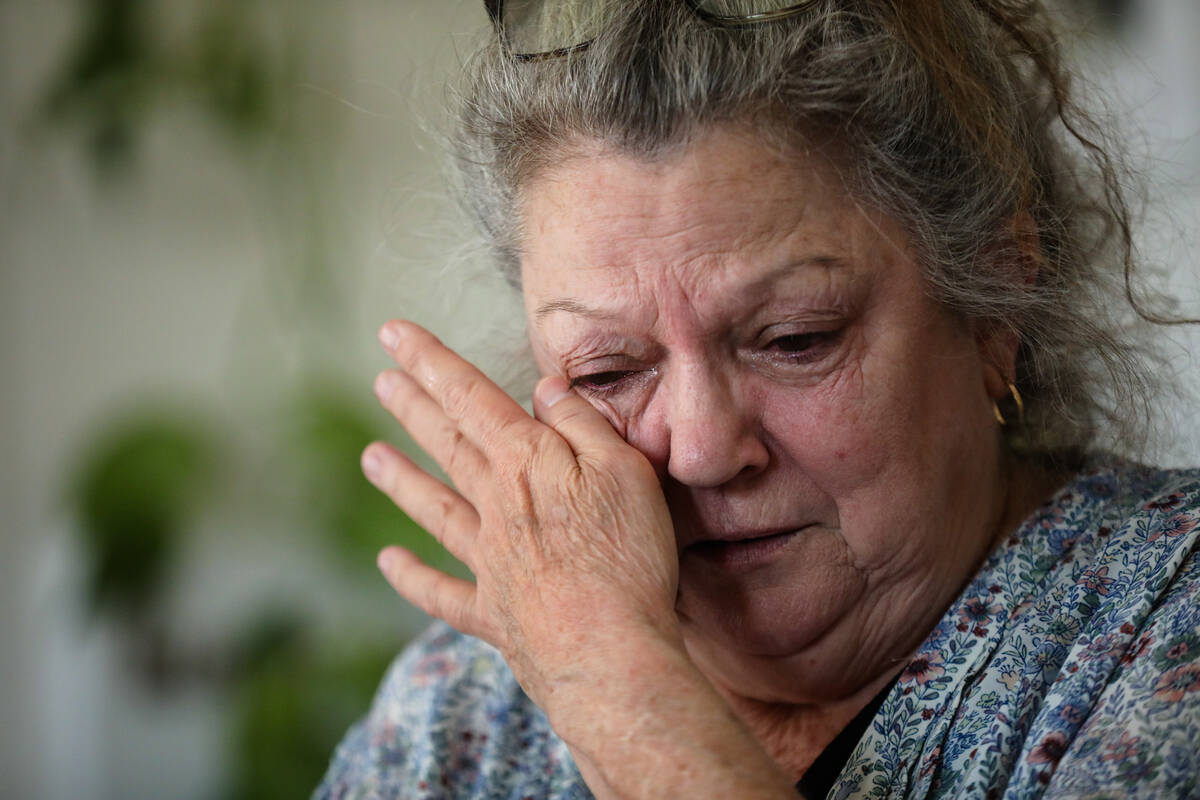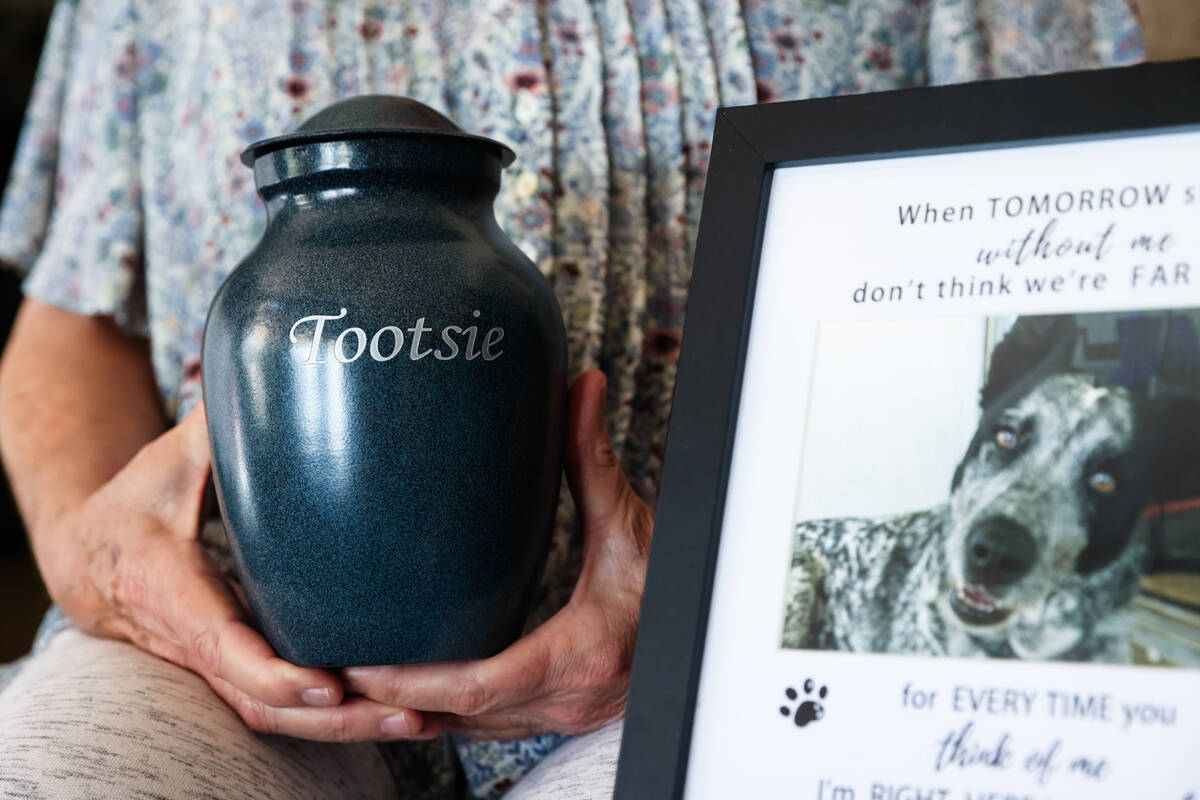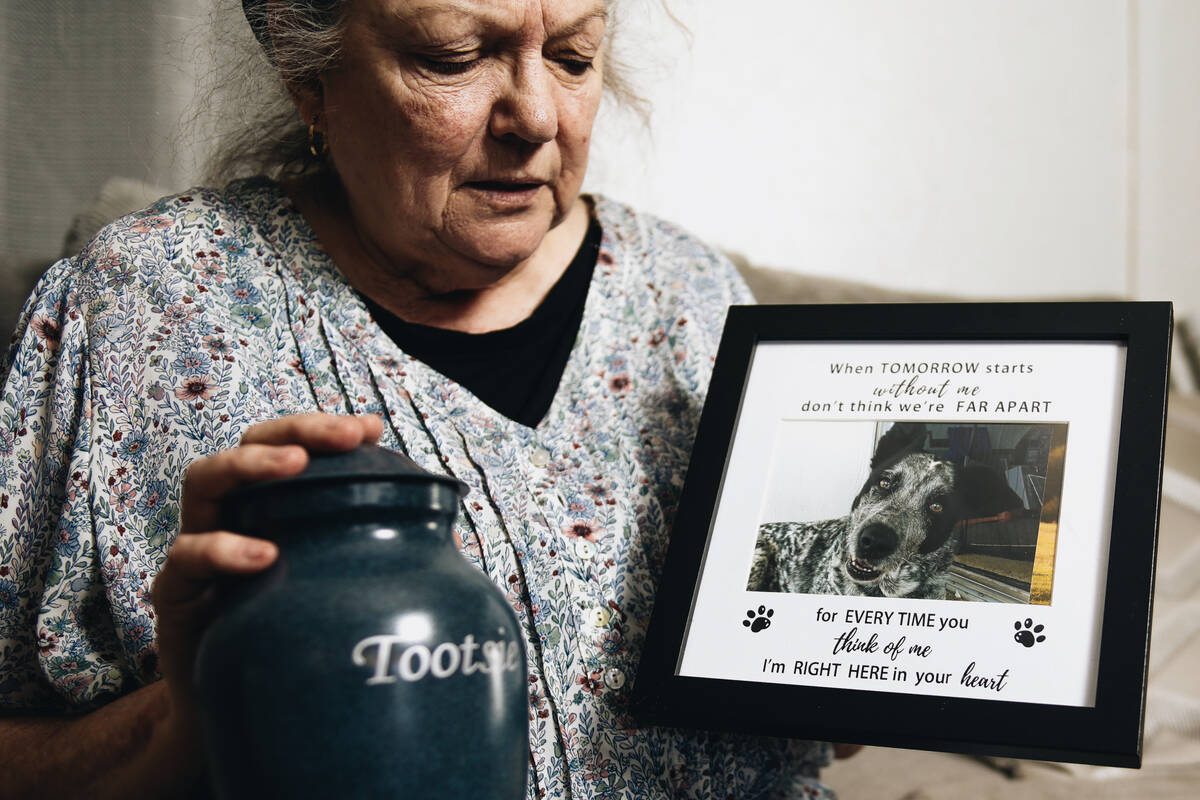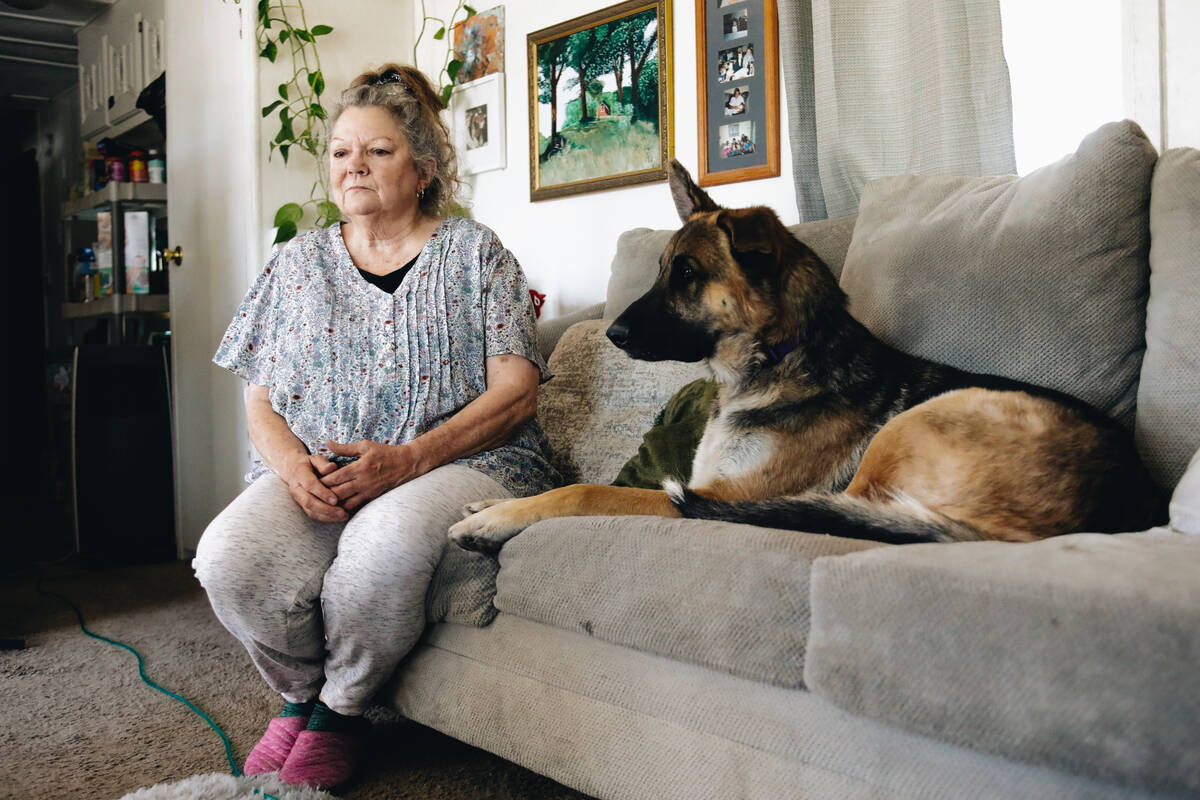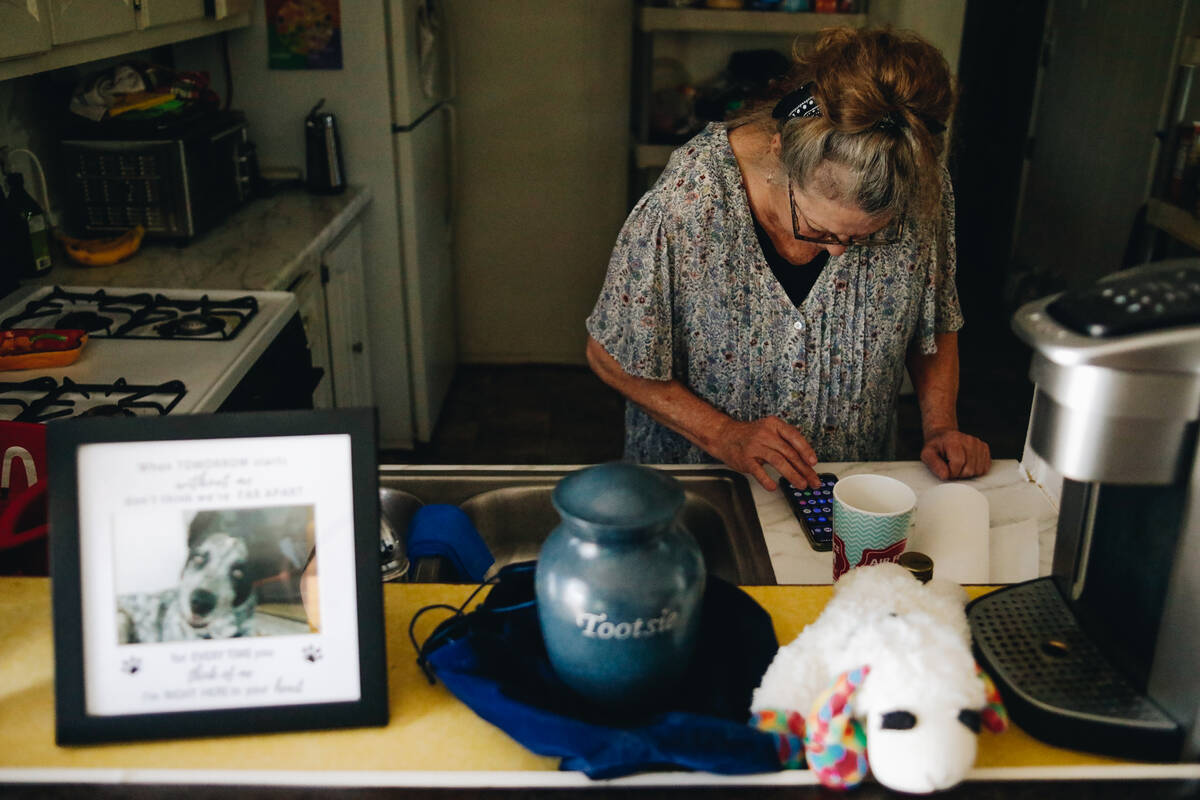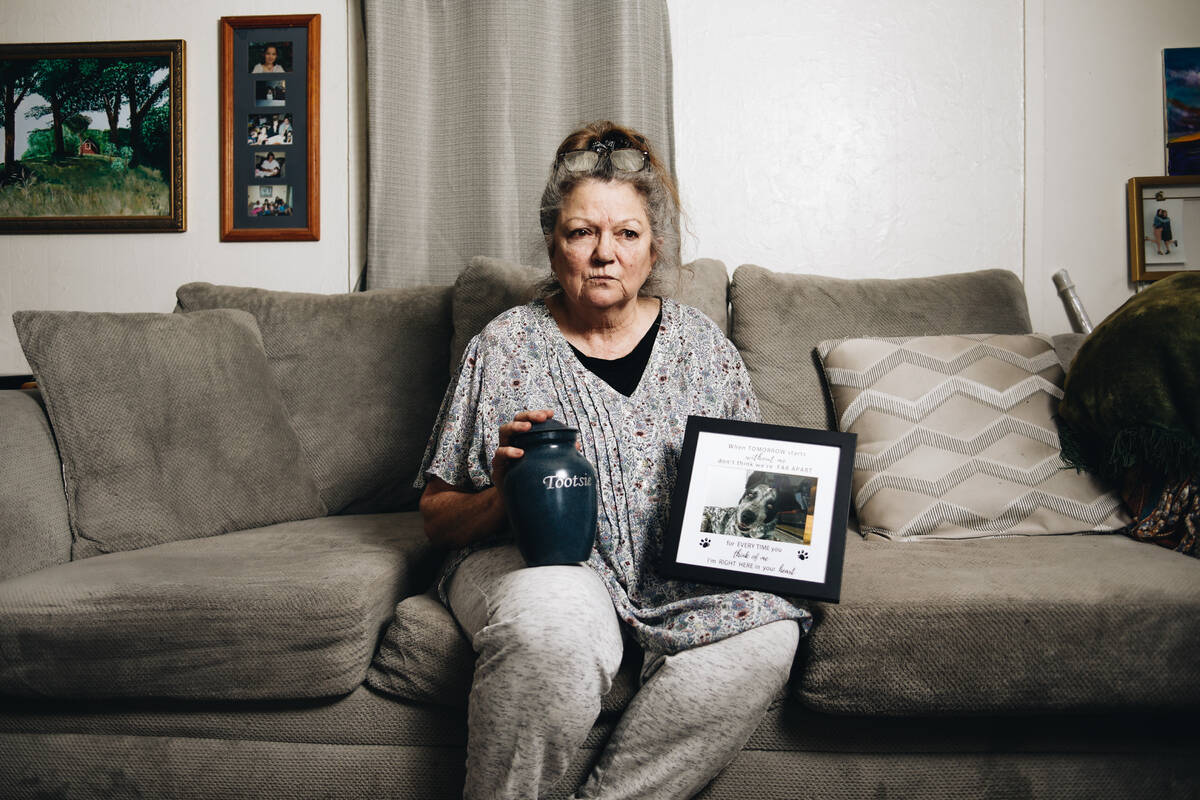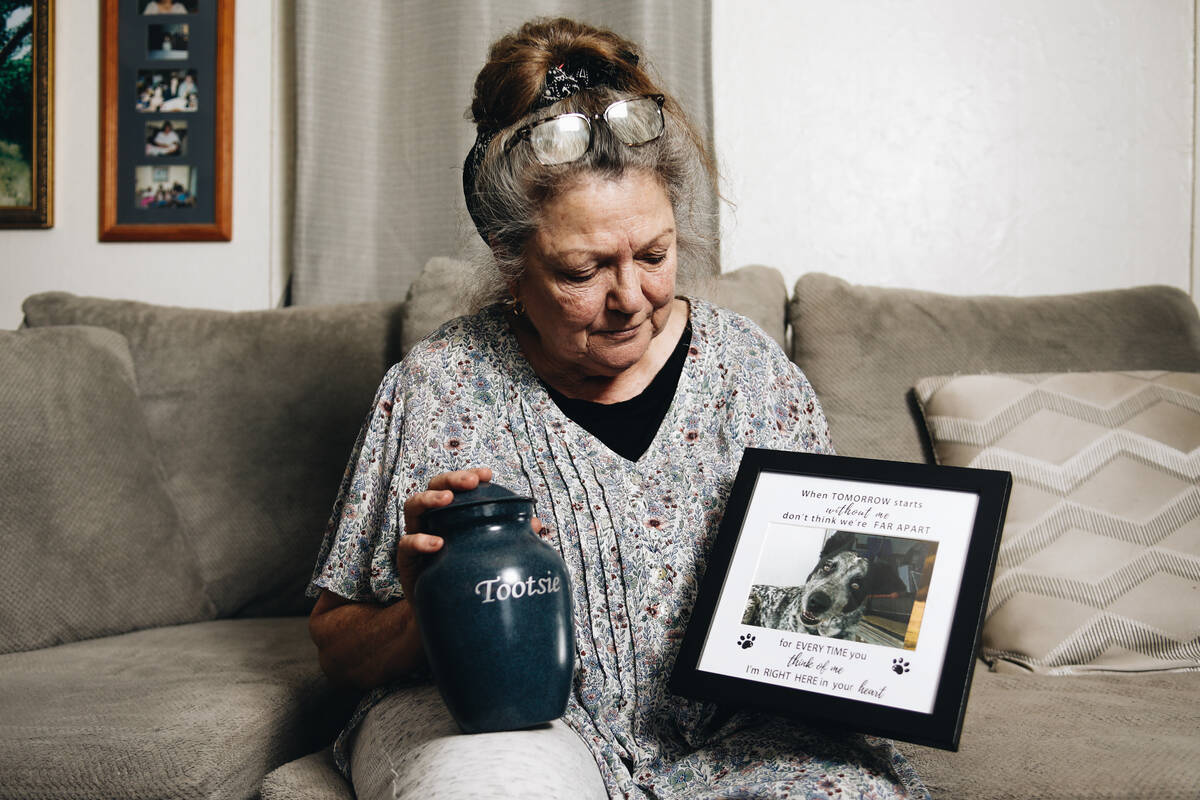Her dog went in for an exam and vaccination. Hours later, the dog was dead
Ten months after the death of her dog during what was supposed to be a routine veterinary appointment, Debbie Hogan continues to look for answers.
“I don’t have any family. She was my world,” the 64-year-old Las Vegan said about Tootsie, the 11-year-old blue heeler/border collie mix she bought as a pup from a California cattle ranch.
At the September appointment, Tootsie was taken into a back room for an exam and a vaccination. More than half an hour later, the dog was brought back to her owner, gasping for air, her tongue blue from a lack of oxygen, Hogan said.
The dog’s condition deteriorated, and within an hour, she would be euthanized.
Hogan filed a complaint with the state veterinary board stating she believes veterinarian Dr. Erika Schroeder and the staff at Paradise Pet Hospital “caused the premature death and great suffering to my beloved blue heeler, Tootsie.”
Schroeder, described on the hospital’s website as its lead doctor, did not respond to requests for comment.
Expecting to have her day before the board, Hogan instead received a letter in January informing her that her complaint had been dismissed because the agency did not find a violation of the state’s Veterinary Practice Act.
Changes to Nevada law that went into effect in 2022 eliminated the requirement that the Nevada Board of Veterinary Medical Examiners deliberate in a public meeting to determine whether a complaint warrants disciplinary action or should be dismissed. Now, a committee of the board deliberates in a meeting that is closed to the public. Complaint assessments that once were public are kept secret.
The new approach “suggests agencies don’t want to explain their processes, or don’t trust people to understand them,” wrote Patrick File, a board member of the Nevada Open Government Coalition and an associate professor of media law at the Reynolds School of Journalism at University of Nevada, Reno, in an email to the Las Vegas Review-Journal.
Complaints filed with the veterinary board and related records are not made public unless they result in disciplinary action by the board. Each year since 2009, between 16 percent and 40 percent of complaints have resulted in disciplinary action, according to board data.
The board’s website shows that Schroeder has not been disciplined. However, she was the subject of another complaint dismissed by the board.
After their complaint was dismissed, lawyer Shawn Mangano and Amy Helt filed a lawsuit against a different veterinary practice where Schroeder then worked. The case alleges that their dogs received improper care during boarding in 2018.
Attorney Alan Westbrook, who represents the defendants, including RMDT LLC, which does business as West Russell Animal Hospital, declined to comment on the ongoing litigation.
‘Everybody loved Tootsie’
On the day of her death, Tootsie ate breakfast and had her morning walk, which included playing with a tennis ball and a Frisbee, Hogan said.
Hogan’s roommate, Maureen Cotton, drove Hogan and Tootsie to the veterinary appointment. In July, veterinarians at the Paradise clinic had diagnosed Tootsie’s chronic cough as bronchitis. Treatment was not helping.
By September, Hogan wanted the cough checked and had also received notification that the dog was due for a shot.
At the appointment, there was a disagreement between a veterinary technician and Schroeder over whether a Bordetella vaccine was needed since Tootsie didn’t go to dog parks. The veterinarian appeared angry, Hogan and Cotton said. The dog was taken to a back room for an exam and the shot.
More than half an hour later, Hogan said in her complaint, the veterinary technician returned the dog to Hogan, telling her Tootsie was having a panic attack and would need to be calmed down before the shot could be given. The technician then left the room, Hogan said in her complaint.
With Tootsie panting and gasping for air, Cotton, who is on oxygen, put her cannula to the dog’s face. Hogan used her phone to take a 14-second video.
“Tootsie was obviously injured somehow and extremely oxygen deprived, as you can plainly see in the video, which Debbie somehow had the presence of mind to document,” Cotton said in a letter provided to the medical board.
After 10 minutes, Hogan said, she screamed for help. Another veterinary technician led the dog out of the room. “That was the last time I saw my beloved Tootsie walking,” Hogan said in the complaint.
The dog was sedated. Hogan said Schroeder told her that to help the dog breathe, she had tried putting several different-sized tubes in Tootsie’s throat, which was bleeding. The veterinarian said she had found a mass in the throat that was likely cancer.
Veterinary records of the appointment state that intubation was attempted with different sizes of tubing until one fit. A tracheotomy was discussed but there was not “the ideal equipment for this and has not been performed here previously,” the records state.
The veterinary records state that euthanasia was discussed as a “reasonable option with all the risks and potential suffering.”
Hogan said she saw no alternative but to agree to put Tootsie down. She has since second-guessed much of what happened that day.
She sought the opinion of an independent veterinarian. Madalina Rosca Burlacu, who resides in Romania, was recommended to Hogan by a group that assists pet owners with veterinary malpractice cases.
In giving her opinion, Rosca Burlacu reviewed veterinary records but not those from the September appointment, which had yet to be provided to Hogan.
“Tootsie’s persistent clinical signs indicated either an undiagnosed underlying condition or an ineffective treatment,” Rosca Burlacu wrote about the dog’s chronic cough. Either way, the dog was not in good clinical condition and was not a good candidate for vaccination, she wrote.
“It is unclear why the attending veterinary doctor rushed the euthanasia process and did not want to try and save Tootsie, considering that the clinical signs were attributable to a mistake that occurred by the negligence of the veterinary doctor herself,” Rosca Burlacu wrote, saying she believed the death was a result of malpractice.
Hogan provided the letter to the veterinary board.
Jennifer Pedigo, executive director of the veterinary board, said the board thoroughly investigates complaints, including conducting interviews and reviewing medical records.
Asked about Rosca Burlacu’s opinion, Pedigo said her understanding was that she was a student of veterinary medicine, but Rosca Burlacu said in an email she is a doctor of veterinary medicine.
‘What are they hiding?’
Pedigo said pets may effectively hide symptoms until they’re under stress. In Tootsie’s case, “I don’t think anyone was in there attempting to harm the pet,” Pedigo said about the visit in question.
Hogan remains frustrated by the lack of transparency. Emails show that she was denied a copy of the minutes of the committee meeting where her complaint was discussed and other records related to the case, with Pedigo referring to statutes requiring confidentiality.
“What are they hiding? It’s my dog. Why can’t you tell me why you dismissed it (the complaint)?” Hogan said in an interview.
Pedigo said there is a balancing act between transparency and the due process rights of those against whom complaints are filed, she said.
The 2021 legislation allowing the board to dismiss complaints in private committee meetings, instead of at public board meetings, helped to streamline the process, Pedigo said. The law does not require that these discussions go behind closed doors. “The Board made the decision to review cases in committee,” she confirmed in an email.
In the public board meetings, complaints were identified by a number and not by the name of the subject of the complaint. Pet owners could not give testimony or ask questions. Only after the board had made its decision on whether to dismiss or move forward with a complaint could the pet owner speak up during a public comment period.
The process “would often lead to more confusion, and people got very upset,” she said.
About the procedural changes, File said: “While I can understand public officials not wanting to confuse or anger the public, I’m not sure that making processes less transparent is the best way to do that.”
Concerns while boarding pets
Helt and Mangano filed a complaint with the veterinary board pertaining to the care their pets received during boarding at West Russell Animal Hospital over the 2018 Christmas holiday. The board dismissed their complaint in 2019, and the couple filed a lawsuit in 2023.
The couple for years had gone to the clinic for both veterinary and boarding services for their pets, including two old dogs who required special care. During the holiday boarding, however, the health of the dogs deteriorated because, according to the lawsuit, their instructions, including providing extra water, were seemingly disregarded.
Helt called daily to check on her pets. Staff told her they were fine, according to the lawsuit. Yet medical records note “declining quality of life” for their dog Mikey, a 17-year-old Maltese mix with a cancerous bladder tumor and on seizure medication.
After a week, “Mikey’s true medical condition was revealed,” the lawsuit states. The dog had not walked since check-in. “Mikey’s condition was viewed as being so dire that Schroeder suggested that he be euthanized.”
Schroeder later called to say that Kellie, the couple’s 15-year-old deaf Dalmatian, “had turned blue and collapsed while being taken outside for a walk,” the lawsuit states. “Kellie, as with Mikey, was suffering from extreme dehydration,” requiring several bags of intravenous fluids.
The next day, Schroeder and Helt discussed by phone the condition of the dogs. The veterinarian “again broached the topic of euthanasia for Mikey and Kellie,” the lawsuit states. The couple rejected this option.
After the pets were retrieved, Kellie recovered within the next 36 hours, the lawsuit states. As for Mikey, after returning home, he started eating, drinking water and walking, the lawsuit states. However, his condition soon worsened and he was euthanized.
On Wednesday, a judge dismissed the lawsuit on the grounds that the plaintiffs missed the filing deadline. Helt said the couple would appeal.
She said they would continue to fight, vowing to seek changes in Nevada law.
“Because we don’t have kids, our pets are our families,” she said. “We need laws to protect the animals, not the vets.”
Contact Mary Hynes at mhynes@reviewjournal.com. Follow @MaryHynes1 on Twitter. Hynes is a member of the Review-Journal’s investigative team, focusing on reporting that holds leaders and agencies accountable and exposes wrongdoing.




